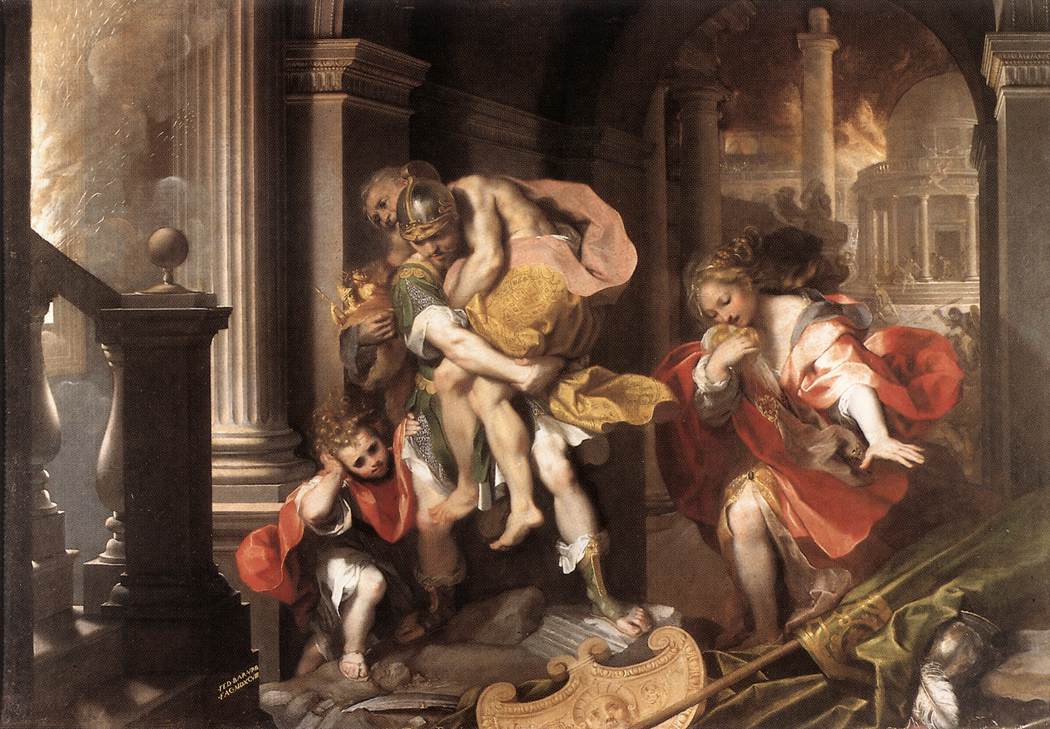 Home Page
Home Page
THE AENEID
INTRODUCTION TO
THE ILIAD AND THE ODYSSEY

Date. Virgil stopped working on it when he
died in 19 BC. His will directed the incomplete poem
be destroyed, but Augustus countermanded the order and
appointed scholars and poets finish the work. The
could trim away lines but we not to add anything.
Author. Publius Vergilius Maro --
Virgil or Vergil. One of history's greatest poets, his
vision of the majesty of Rome influenced not only Rome but
also those empires desiring to be like Rome.
Religion & Myth. Romans combined their
own traditional religion with Greek mythology. The
gods in the Aeneid therefore resemble their
counterparts in the Iliad and the Odyssey.
Unity. Books
1-6 are based on the wanderings of the Odyssey,
books 7-12 on the conflict of the Iliad.
Length. Virgil composes an
epic that has half the length of his major models: he stops
at 12 books, and that seems to be all he intended.
Genre. Epic
poem. While the Iliad and the Odyssey
were oral epics (composed primarily without paper for
singing), the Aeneid is a literary epic, composed
on paper, though still primarily to be sung for an
audience.
Scene. From the fall
of Troy to the settling on the Italian
peninsula.
Epic theme.
Traditionally, the Aeneid has been interpreted as a
work glorifying the Roman Empire in general and Augustus in
particular. With more jaundiced views of the imperial
project, other interpretations have arisen based on
statements that point to the problematic nature of such a
project. The most straightforward statement of the
glory of Rome is found in Aeneid 6. 847-853:
credo equidem, vivos ducent de marmore voltus,
orabunt causas melius, caelique meatus
describent radio, et surgentia sidera dicent: 850
tu regere imperio populos, Romane, memento;
hae tibi erunt artes; pacisque imponere morem,
parcere subiectis, et debellare superbos.”
Others will forge breathing bronzes more smoothly
(I believe it at any rate), and draw forth living features from marble.
They will plead law-suits better and trace the movements
Of the sky with a rod and describe the rising stars.
You, O Roman, govern the nations with your power- remember this!
These will be your arts – to impose the ways of peace,
To show mercy to the conquered and to subdue the proud.
Tacitus gives the clearest statement of the opposite
opinion:
solitudinem faciunt, pacem
appellant(The Romans make a desert and call
it peace).
753 BC City founded by Romulus & Remus. (8th Cen BC) They come from Alba Longa, which was founded by Silvius.
We have approximately the right time frame for a wanderer to leave Troy and come to Rome
Odysseus wandered as well, as did Menelaus.
Fits archaeology of the sea people. Egyptians record raids by Danaans.
Number of places in Italy settled by Greeks.
These early legends help shape the Aeneid.
- Aeneas . Fights locals to standstill.
- Ascanius. Builds Alba Longa.
- Romulus & Remus. Princess turns up pregnant. Who's the daddy? Tall handsome guy calling himself Mars. Standard defense of a pg single girl to blame a god. Dad doesn't believe her. He locks her up. She gives birth to twins. King gets rid of babies by having them exposed. If you kill them, their blood is on your hands. Expose them, the gods decide. She-wolf who lost litter adopts the boys.
Wolf becomes the totem of Rome. Is sacred to Mars. The Romans are destined to rule through war, but then to bring civilization.
Romulus & Remus found city, but fight over preeminance and Romulus kills Remus. Theme of internal strife emerges.
Roman history
753 BC Founded. Rex rules
509 BC. Tarquin expelled over the rape of Lucretia Republic
set up. Rules by Patricians. They set up the Senate.
Elect 2 Consuls. 2nd time to have two executives over a
city. Sparta had 2 kings. Is good if one gets killed,
disaster if they both try to lead. Rome expanded into Italy
and Sicily. There come into conflict with Macedonia and
Carthage. Carthage almost destroys them. Patricians have to
appeal to plebians to join the army.
Must give them rights now.
Patricians - Senate - Consuls
Plebeans - Popular Assembly - Tribunes
133 BC. Tiberius Gracchus. Popular Tribune. Patricians
accuse him of wanting to be a tyrant, assassinate him.
124 BC. Gaius Gracchus follows brother. Also assassinated.
Birth of a Meme
In the 1st century BC, Octavius and Marc Antony were
competing for the control of the Roman Empire. The young
Octavius was a rather cold fish and was not very well known
to the public or the legions. Antony, by contrast, was
probably the most popular man in the empire, well-loved by
the legions and the public alike. The solution? Octavius
didn't attack Antony directly; instead, his propaganda
machine attacked the woman beside him: Cleopatra. Cleopatra
was an Egyptian temptress, a witch who was controlling poor
Antony. Octavius represented Rome, the West, Civilization,
reason and patriarchy. Cleopatra represented Egypt, the
East, barbarism, emotionalism, and matriarchy. She had
bewitched Antony into fighting against his own country.
Eventually Virgil enshrined Octavius' propaganda in "the
Aeneid," which expands the Octavius-Cleopatria conflict to a
general conflict between patriarchy and matriarchy. Women
are a great danger throughout, and have to be reined in by
Daddy. This thinking permeated Western thought & is
always ready to be trotted out when needed. Like when a very
personable and popular Bill Clinton got elected. The right
wing chose the strategy of attacking his wife as the power
behind the throne. "Billary" is just an update of
Antony and Cleopatra.
